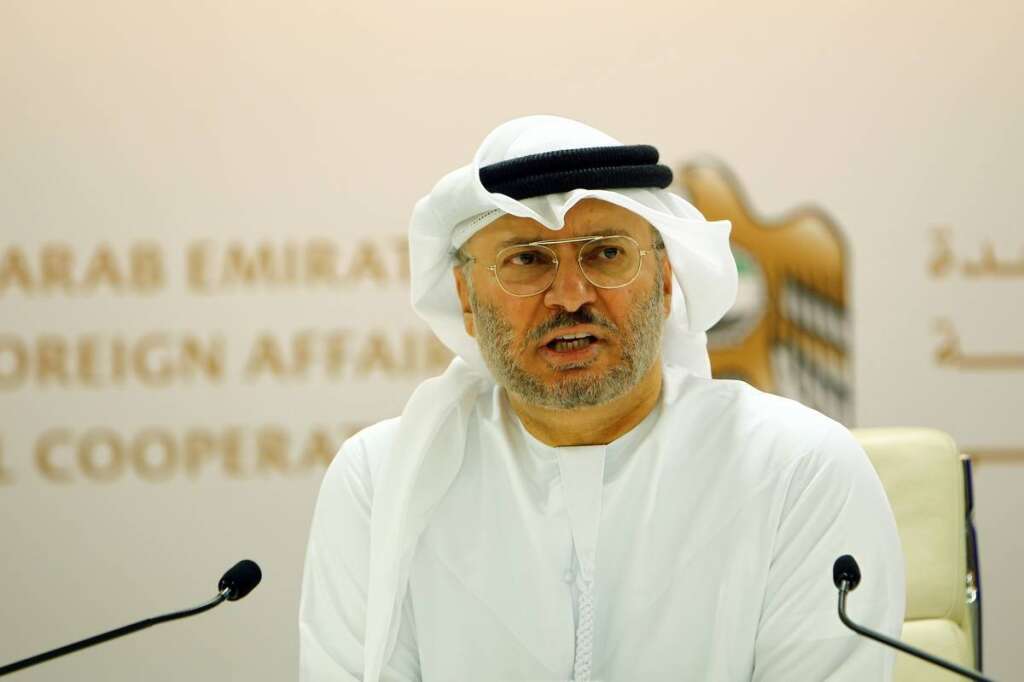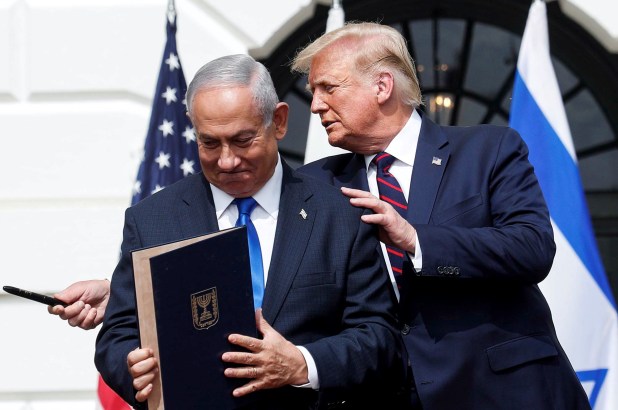Before Tuesday’s remarkable events began at the White House, Palestinians in the West Bank dutifully protested the decisions by the United Arab Emirates and Bahrain to recognize Israel’s right to exist. Later, during the ceremony, Palestinians in Gaza fired two rockets into southern Israel, inflicting minor injuries on two civilians. The rage of the Arab Street ain’t what it used to be.
Even the limited expressions of anger were mostly for television cameras. The Palestinians could have had their own state several times over the last two decades, but could never take yes for an answer, so now the train of history has left them standing at the station.
They accuse their fellow Arabs of betrayal and stabbing them in the back. But in fact, it is two generations of Palestinian leadership that have betrayed their own people and forfeited their veto over peace.
They lost that veto because Donald Trump took it from them. The president, breaking the mold set by his predecessors. Still, he offered the Palestinians a deal, the “deal of the century,” he called it, but they responded with insults and intransigence.
It was a huge mistake, one that reduced them to disheartened spectators as the world watched in astonishment as two more Arab countries took the historic step of normalizing relations with the Jewish State. The likelihood that others will soon follow, possibly including Saudi Arabia, means that Israel will no longer be a pariah in its own neighborhood.
If nothing else, the agreements will push the anti-Semites at the United Nations to find a new scapegoat for the world’s problems. Even Rep. Ilhan Omar will be hard-pressed to come up with a vile objection this time.
Iran, of course, is the other major loser of the day. The Arab monarchies it has threatened repeatedly are lining up to join America and Israel in an alliance against the mad mullahs. As Trump put it in his remarks, “We’re here to change the course of history.”
Big decisions have big consequences and Trump’s Mideast policy is remarkable not only for its success, but also for its unprecedented approach. The contrast with Barack Obama is especially dramatic.
Until Obama, recent presidents of both parties followed a similar script of supporting Israel while being a buffer between it and its hostile Arab neighbors. The goal was to be an “honest broker” while guaranteeing Israel’s security as long as it respected American interests in the Arab world. Those interests included oil and, increasingly, funding for the perpetually bankrupt Palestinians, who returned the favor with massive corruption and by making “martyr” payments to the families of terrorists who killed Israelis.
Incredibly, he even urged the Palestinians not to negotiate with Israel until Israel stopped constructing and expanding settlements in the West Bank. Obama openly disliked and insulted Israeli Prime Minister Benjamin Netanyahu, once forcing him to leave the White House through a back door, and secretly used American funds to try to defeat Netanyahu in an election.These transgressions were apparently minor obstacles to Obama, who believed he knew best. He thought he could lure the Muslim world to his view by apologizing for past American behavior and promising to restrain Israel and forcing it to make concessions to the Palestinians.
His record was perfect — a perfect failure. There were, for example, zero serious negotiations between Israel and the Palestinians for the eight years of the Obama-Biden administration.
Yet that wasn’t Obama’s only mistake in the region. He showed a repugnant soft spot for Israel’s greatest enemy, Iran, despite the warning of Netanyahu and others that the nuclear deal paved the way for weapons that would be an existential threat to Israel.
Again, Obama knew best and coddled the mullahs, no matter that they used the money he gave them to spread terror far and wide. Their role in both Syria and Iraq, for example, has posed direct threats to our allies and interests.
Trump, like a pendulum swinging in the opposite direction, deliberately reversed all those policies. He moved the US Embassy to Jerusalem, correctly predicting that threats of Arab violence were false. He approved Israel’s annexation of the Golan Heights, another American first.
As he recounted Tuesday, the president thought funding the Palestinians also was wrong. Beyond the “martyr” payments, he noted that Palestinian leaders refused even to negotiate with his administration. Why, he asked, should we reward their bad behavior?
He held Iran to the same standard. Trump pulled out of the nuclear deal, imposed harsh economic sanctions and eliminated Qasem Soleimani, the Quds Force general who played a role in the deaths and injuries of hundreds of American soldiers in Iraq.
American strength is what most appealed to the Arab states. They fear Iran more than Israel and, whatever their history with Israel, now openly recognize it as a full partner against Iran.
The agreements signed at the gathering on the South Lawn of the White House are fittingly called the Abraham Accords. They mark a new era of trade, tourism and opportunity for millions of Jews, Muslims and Christians in the region. Trump clearly savored the moment but, ever restless, says he’s not finished yet. He told reporters he believes the Palestinians eventually will want to negotiate and predicted that, if he wins a second term, he will make a deal with the Iranians, too.
The changes, he said, are just the start of a “new Middle East.” Only a fool would quibble on a day as big as this one.


.jpeg)